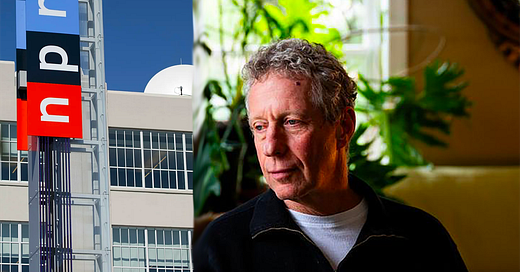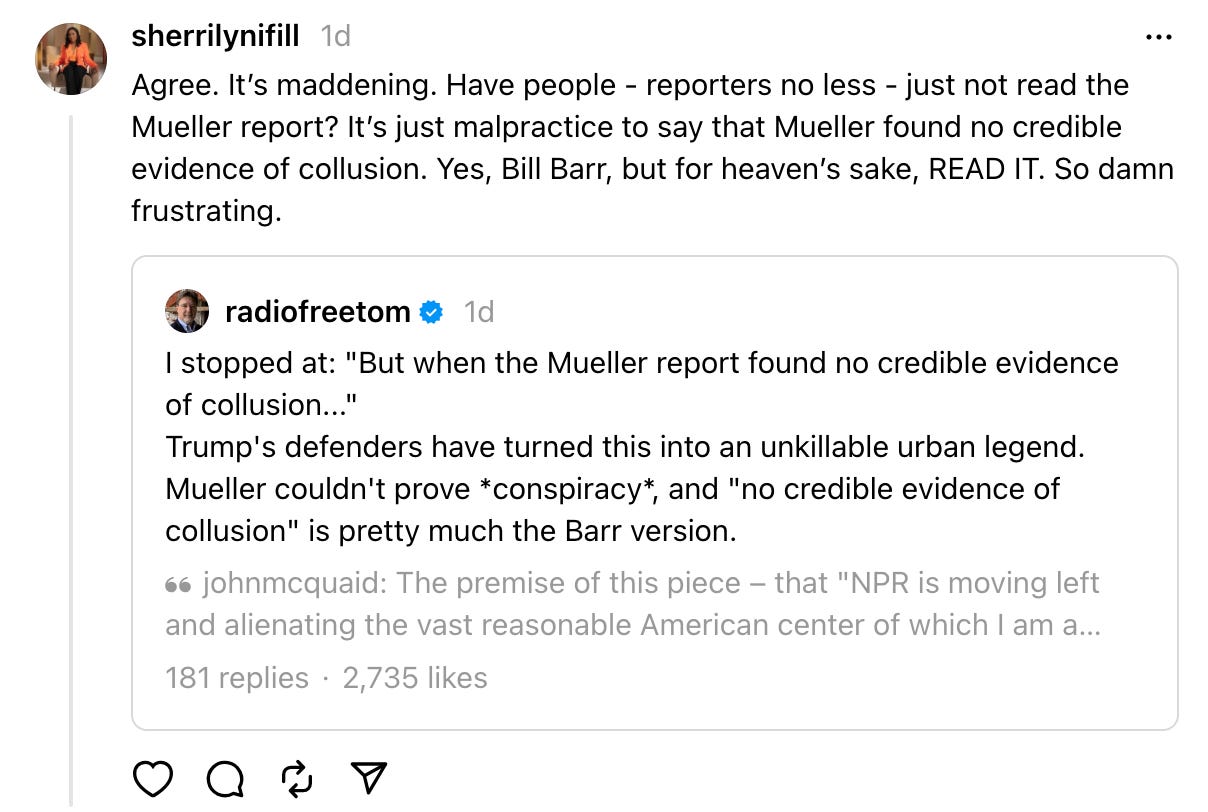NPR’s Uri Berliner Exposes How Liberal Racism Works (part 1)
The NPR business editor took to a right-wing site to inveigh against his employer. But he forgot the fundamentals of journalism - checking his facts.
By now, many of you may have at least heard of the Uri Berliner piece roundly criticizing NPR for being too woke. Except he didn’t say woke. He said NPR is “telling listeners how to think” and “ignoring its core audience.”
By which he means, liberal cis-white men like himself, whom he describes as “EV-driving, Wordle-playing, tote bag–carrying coastal elite.”
I read this story when it came out on Tuesday with disbelief and anger. Disbelief because almost everything Berliner used to support his argument was patently, and provably, untrue. Anger because of the larger issues he missed.
We’ll start with the untruths. There are so many of them, it will take this entire column. Next week, we’ll get to what I learned about how a lot of folks in public radio view inclusion.
The Free Press
Berliner published his piece not in the Current - NPR’s industry publication - or the NY Times, the Washington Post, the Atlantic - any of the reputable outlets which he, a national network business news editor and reporter, would have access to. He published it in Bari Weiss’ “Free Press.”
Weiss left the New York Times, where she was a columnist, in 2020, writing the same kind of “anti-woke” screed that Berliner wrote.
But as Edmund Lee notes in his Times story about Weiss’ resignation, she was only hired in 2017 “as part of the paper’s effort to broaden the ideological range of its opinion staff after President Trump’s inauguration.”
In other words, Weiss was an ideological diversity hire.
Weiss is known mostly for platforming anti-trans views, including the completely false story of Jamie Reed - a former trans clinic worker in Missouri, who became a darling of right-wing media when she asserted teens were getting gender-affirming care with almost no medical examination.
Many news outlets, including the St. Louis Post Dispatch and the American Prospect, fact-checked Reed and sounded the alarm about her falsehoods.
Weiss did not.
Which is why it was laughable when Berliner cited numerous utterly specious examples supporting his assertions of NPR “miscues” in its coverage.
Fact checking - or perhaps fact understanding - is clearly not his forte either.
Untruth #1: The Mueller Report
Berliner’s first false allegation was that the Mueller Report found “no collusion.”
OK, it’s 480-pages. And it doesn’t read like an Anne Patchett novel, so I can understand why many people have not read the Mueller report. I understand less why every journalist in the country has not read the Mueller report. And I don’t understand at all how Berliner could be commenting on something he’s clearly never read, as Sherrilyn Ifill pointed out on Threads.
The Mueller Report, as Barbara McQuade and Joyce White Vance pointed out in 2019, finds multiple instances of the Trump team and Russians working together - like the infamous meeting in Trump tower that was uncovered with the release of Don Jr.’s emails.
Mueller and his team found evidence that Russia was sharing intelligence with members of the Trump team - intelligence that included hacked DNC emails. And Mueller’s investigators found evidence of obstruction from the Trump team.
They also found evidence that Russia was targeting ads with great specificity to left-leaning Bernie Sanders supporters in Wisconsin and Michigan, and that the Russians then alerted Trump’s team to make a last minute schedule change to visit those states.
Hence, the “Hillary never visited us” lament I heard from so many lefty, Jill Stein-voting Wisconsinites - including journalists. Funny, what I didn’t see was a comparison of how many times other presidential candidates, over the last few decades, visited the state in the last month of a campaign.
That would be - to mimic Berliner’s phrasing - journalism.
The conclusion Mueller came to, though, was that either there was not enough evidence to prosecute beyond a reasonable doubt, or that he was hindered from bringing charges because of a Justice Department rule that a sitting president could not be prosecuted.
Mueller very clearly stated that “while this report does not conclude that the President committed a crime, it also does not exonerate him.”
So, Berliner is just plain wrong that the Mueller Report “found no credible evidence of collusion.”
It found a lot. Mueller just declined to prosecute it. That doesn’t mean NPR’s coverage of the investigation was biased.
Untruth #2: Hunter’s Laptop
Now, it is possible that Berliner read the Mueller Report and took only what he wanted from it.
Which is what he seems to have done with the “Hunter’s laptop” story.
Berliner writes:
In October 2020, the New York Post published the explosive report about the laptop Hunter Biden abandoned at a Delaware computer shop containing emails about his sordid business dealings. With the election only weeks away, NPR turned a blind eye… The laptop did belong to Hunter Biden. Its contents revealed his connection to the corrupt world of multimillion-dollar influence peddling and its possible implications for his father.
His laptop revealed no such thing.
And the New York Post’s assertions that the laptop was about a “money laundering investigation” were disputed by a later Washington Post story, which noted that “the MacBook itself is now in the hands of the FBI, which is investigating whether Hunter Biden properly reported income from business dealings.
Hunter Biden is now under indictment in California for tax evasion.
Not money laundering.
The informant that FBI sources were relying upon - and disavowing at the same time - is also under indictment in California, for lying to the FBI about Hunter Biden, Joe Biden and Burisma. It was also discovered that he had ties to Russian intelligence.
Berliner actually linked that Washington Post piece in his screed, calling it confirmation of the New York Post’s “explosive” reporting - which it wasn’t - and somehow confirmation of Hunter’s “sordid” and “corrupt” business dealings. Which it did not. The WaPo story was mostly about how so many people had gotten their hands on the laptop’s data that it was hard to figure out what was real and timely and what was not.
The worst the WaPo story came up with was an email sent from a Burisma official that “thanked Hunter Biden ‘for inviting me to DC and giving me an opportunity to meet your father and spent [sic] some time together.’”
It is not clear there was a meeting, or if they just shook hands, or that President Biden knew who the guy was.
So, Berliner linked to a story to prove a point which the story he linked to did not prove.
He also ignored that the New York Post wasn’t even sure of its “explosive” story - which is Berliner’s entire basis for questioning NPR’s coverage of the Mueller report.
As Dan Kennedy notes in his Media Nation blog, “The reporter who wrote most of [the Post story] refused to let the paper put his byline on it ‘because he had concerns over the article’s credibility.’ Another staff member whose byline did appear did little work on the story and didn’t realize her name would be on it until after it was published.”
This is hardly, as Berliner writes, “Journalism that lets evidence lead the way.”
Untruth #3: When Statistics Are Used to Defend Lies
Oh, I do love when people massage statistics to say what they don’t actually say.
In this case, Berliner cites listener demographics from 2011 and 2023, and makes conclusions without evidence.
Back in 2011, although NPR’s audience tilted a bit to the left, it still bore a resemblance to America at large. Twenty-six percent of listeners described themselves as conservative, 23 percent as middle of the road, and 37 percent as liberal.
By 2023, the picture was completely different: only 11 percent described themselves as very or somewhat conservative, 21 percent as middle of the road, and 67 percent of listeners said they were very or somewhat liberal. We weren’t just losing conservatives; we were also losing moderates and traditional liberals.
This led him to the conclusion that “an open-minded spirit no longer exists within NPR, and now, predictably, we don’t have an audience that reflects America.”
I would argue that this absolutely reflects an audience that fits America in that most conservatives consume news from outlets that cater specifically to their ideology. And lie to them.
If Fox is telling it’s listeners lies they want to hear, and NPR is telling the truth, then the people who want to hear lies are going to stop listening to the network that tells the truth.
NPR media reporter David Folkenflik addresses this in his report on Berliner’s piece.
Untruth #4: Advocacy Groups
My favorite part of the Berliner piece is when he lists all the affinity groups that have sprung up in the last decade at NPR. I will admit, I find the alphabet soup names funny, but I find it vital for people to come together and talk about their experiences.
Berliner does too. But when other peoples’ experience affect coverage, Berliner thinks a line has been crossed.
The New York Times reported Thursday that emails from October show that when the network considered deferring to language proposed by the Arab and Middle Eastern Journalism Association in its Gaza coverage, Berliner - whose mother was a Holocaust refugee - responded with, “We don’t need to rely on an advocacy group’s guidance.”
Somehow, because a group of journalists have come together based on their experiences as Arabs and/or Middle Easterners, that makes them biased? What standard are they biased against? What if a Jewish journalist group had suggested language? Would that be OK?
Berliner ends his Free Press piece by noting:
“All this reflected a broader movement in the culture of people clustering together based on ideology or a characteristic of birth.”
That emphasis is mine. Berliner seems to think inclusivity is about skin color or national origin, not experiences people have.
And a lot of other journalists think that, too.
That’s for next week.
Today is my birthday!
I was born on a Sunday and it’s rare that I have a birthday on a Sunday.
I’m going to call this a special moment and… ask you to support You’re Overthinking It
with a yearly subscription. 15% off forever.
Uri Berliner, NPR and Liberal Racism (Part 2)
Back in 2016, I was part of a Facebook group of female journalists. The idea was to have veteran journalists give advice to newbies. But the entire group ended up being about the newbies asking the veterans how we handled sexual harassment. Every day, it seemed, there was a different story.










